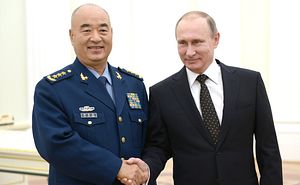Time for your weekly round-up of China links…
One of China’s top military officials made an official visit to Russia this week, China Military Online reports. Xu Qiliang, a vice chairman of China’s Central Military Commission, met with Russian President Vladimir Putin and Defense Minister Sergei Shoigu. Xu is in charge of military and technical cooperation with Russia.
During the visit, Putin praised China-Russia relations as “a serious stabilizing factor in world affairs,” and encouraged deeper military relations, including joint drills and training. “The military cooperation between the two countries is unique and important part of our relationship,” he said, according to Xinhua.
Xu’s visit to Russia comes amid news that Beijing and Moscow have inked a $2 billion deal for China to purchase 24 Sukhoi Su-35 fighter jets from Russia. My colleague Franz-Stefan Gady has more.
In other security news, Chinese media reported that Xinjiang police had killed 28 members of a terrorist group after a manhunt lasting nearly two months. The terrorists were allegedly the perpetrators of an attack on a coal mine in Xinjiang on September 18, which received little coverage at the time in Chinese media. Xinhua reports that the manhunt for the suspects “involved more than 10,000 citizens and police searching an area of 1,300 square kilometers.”
Xinhua also noted that that group “was directly guided by an overseas extremists group,” which members of the group reportedly contacted several times before and after the attack on the mine. However, Xinjiang officials declined to name the overseas group involved, saying the investigation was still ongoing.
Moving on to diplomacy, Sudha Ramachandran looked at recent developments in China-Nepal relations for the Jamestown Foundation’s China Brief. Ramachandran places the recent downturn in India-Nepal relations (and corresponding boost in Kathmandu’s ties with Beijing) in historical context.
Over at The Economist, there’s a look at sex education in China – which, for many, doesn’t start until college. That means most Chinese students aren’t taught basic connection between conception and intercourse, much less how to protect themselves from sexually transmitted diseases or unwanted pregnancies. “Most Chinese youths find out about sex from the internet and online pornography,” the article notes, adding (in quite the understatement), “That does not work well.”
Finally, the U.S.-China Economic and Security Review Commission released its annual report to Congress this week. For those who are truly dedicated to their weekend China reading, here’s the link to the full text of the report. For those who only need a brief summary, check out the statements on the report from the Commission chair and vice chair, William Reinsch and Dennis Shea, respectively. The tl;dr version: the Commission is not satisfied with China’s attempts at economic reform and opening, cyber espionage, or its “aggression in the South and East China Seas.”

































